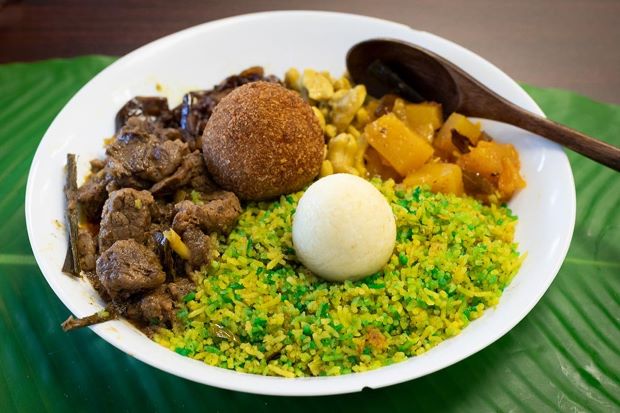Banana Leaf in East Orlando spices it up with staples of Sri Lankan cuisine
By Faiyaz Kara
Sri Lanka’s two main ethnic groups — the majority Sinhalese and the minority Tamils — have long had a contentious, violent relationship that’s seen civil wars and ethnic cleansing woven into the island nation’s brutal history. Differences in religion, language and politics have driven a wedge between the two, but food, like it so often does, has played a unifying role. Or at least tried to.
It’s tempting to say that Tamil cuisine has been heavily influenced by the flavours of South India (Tamil Nadu in particular) while Sinhalese cookery incorporates flavours introduced by the Dutch and Portuguese, but that would be an oversimplification.
“Tamil food tends to be on the hotter side compared to Sinhalese,” says noted Toronto-based, Sri Lankan-born food writer Suresh Doss. “But there’s more use of roasted spices in Sinhalese cuisine — particularly black pepper — and lesser use of oil. There’s a noticeable vibrancy as a result of this. That said, it’s important to understand that there’s been quite a bit of osmosis between the cultures over time.”
That culinary intermingling is on full display at Banana Leaf in East Orlando, purported to be Florida’s only Sri Lankan restaurant by Nilanga Dassanayake, the affable Sinhalese owner of the restaurant. Indeed, Sri Lankans from Fort Myers to Fort Pierce to Fort Lauderdale make the drive to this cozy South Alafaya Trail spot to partake in a buffet ($20.99) that looks undoubtedly vibrant — red rice, green eggplant curry, blue mackerel, yellow potato curry….
On a weekend visit, a spicy pork curry sat next to a roasted chicken curry with dried pandan leaves. There were tempered chickpeas, papadums and a jakfruit curry too. But buffets can be hit-or-miss, and this one fell somewhere in between — the eggplant and jakfruit were hits, but I’m not necessarily making a three-hour drive to sample the pork, chicken or fish, fine though they were.
What I hoped to see was a thick liver fry or a wholly gratifying egg curry of the sort Doss and I recently scarfed down with crepe-like coconut hoppers at New Kalyani, a humble little eatery in Scarborough. “We’re not offering hoppers just yet,” says Dassanayake. “They take a long time to make, but we will one day.”
Until then, Banana Leaf’s kothu roti ($16.99) is ready for the taking. This looker comes stacked with a generous tossing of chopped-up bits of roti, chicken (our choice), scrambled eggs, onions, scallions, leeks, and a host of spices and chilies. Cabbage and carrots lend a healthy crunch, and it’s easy to see why it’s the most popular street food in Sri Lanka.
Also glorious: a veg roti meal ($11.99) comprising two flaky paratha, creamy dhal made with coconut milk, and seeni sambal, a heady, spicy relish of caramelized onions. Doesn’t get much more comforting than that, no matter your ethnicity.
The biryani ($15.99) wasn’t anything like I expected. Yes, it’s a rice dish, but it’s presented more like a ramen bowl, with condiments and sides — pineapple curry, eggplant, cashew curry and fish cutlet ball — placed around the perimeter of the bowl and a fried egg split in half set over rice. I ordered it with beef ($17.99), which, like the chicken and mutton, are halal. That makes Banana Leaf a draw for another of Sri Lanka’s ethnic minorities — Muslims.
I tried the mutton (chewy, fatty) in curry form ($16.99) on another visit with pol roti, a rustic flatbread fashioned from flour and shredded coconut, but I can’t say I was a fan of the dry, biscuity texture. Ghodhamba roti fared a bit better. The dough is soaked in oil before being stretched and cooked. On my first visit here, I spoke to my friend of the egg roti I enjoyed at New Kalyani — a cook wielding a couple of scrapers rapidly chopped and tossed a spiced egg mixture before scooping it all into an enormous roti being griddled next to the egg; the roti was then folded and cut into triangular wedges. I still crave that egg roti, and so I ordered Banana Leaf’s version ($5). The issue: not enough egg mixture in the roti (yes, I know about the price of eggs these days) and portions of the roti were too thick, and undercooked.
Still, there’s quite a bit more on the menu I’d like to try here, like the black pork curry ($15.99) made from black pepper, toasted coconut and roasted curry powder, and dried sprats ($15.99) fried in tomatoes and onions.
Greek yogurt with a drizzle of palm treacle made a perfectly satisfactory ending from the buffet, especially with sips of arrack ($10), a Sri Lankan spirit distilled from the fermented sap of coconut flowers. Not to be outdone, Dassanayake came by and played up an ending called “love cake” ($5). “It takes three hours to make and it’s the only thing I don’t share,” he says.
I’m a sucker for a good sales pitch, and I was sold. And the love cake, with its honey, semolina, egg whites and cashews? Much like the menu, it was a many-splendored thing.
-orlandoweekly.com



Comments are closed, but trackbacks and pingbacks are open.